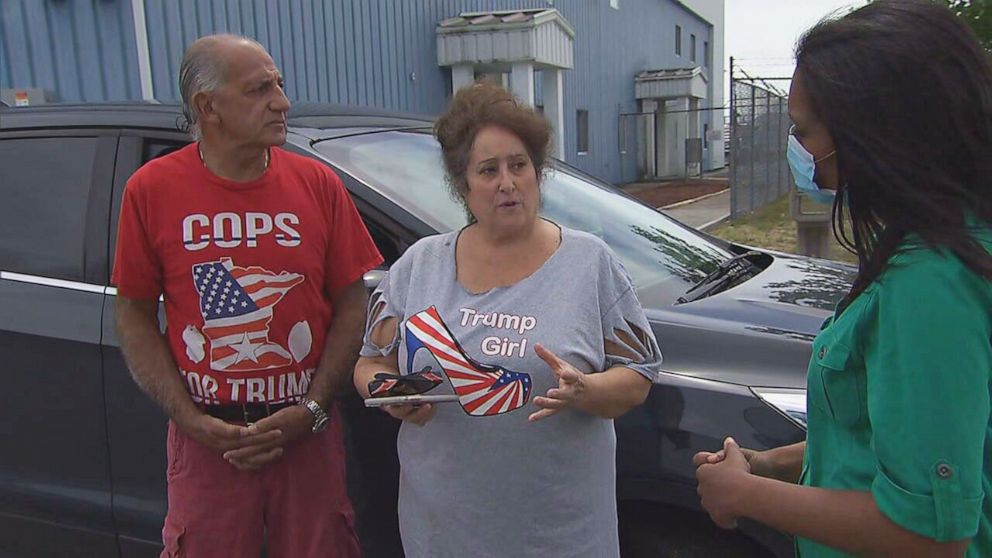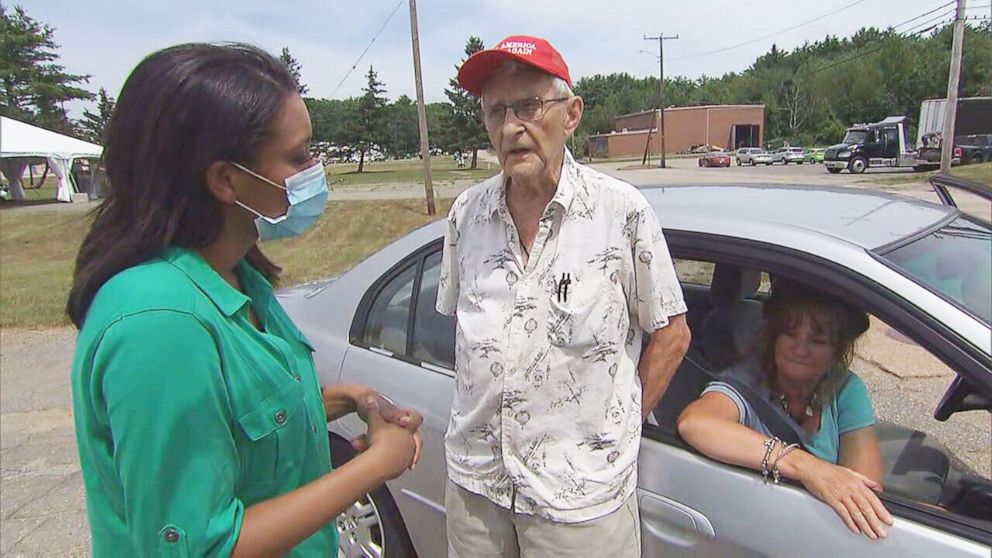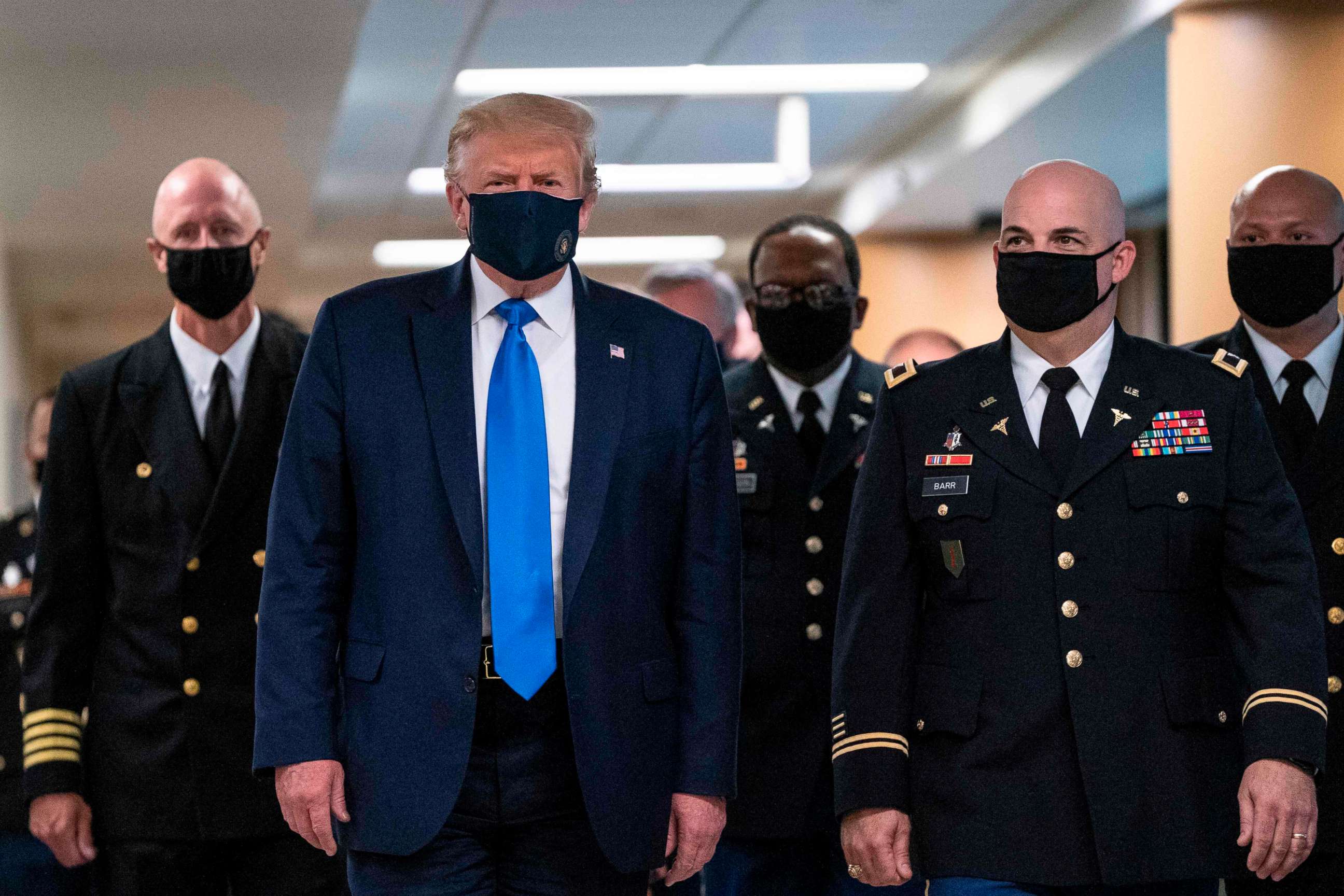As Trump sends mixed messages on coronavirus, some loyal supporters cling to conspiracy theories
Since the early days of the virus, the president has downplayed its impact.
With coronavirus cases surging around the country, President Donald Trump has continued to cast doubt on health officials and his own administration’s response to the pandemic, leading some of his fiercely loyal supporters to question not only advice from experts but the existence of the virus itself.
Since the early days of the virus, the president has repeatedly downplayed its impact, promised it would "disappear," incorrectly compared it to the seasonal flu multiple times and bucked wearing a mask until months into the pandemic, even mocking political opponents who did wear them.
In response, ardent supporters have echoed the president’s shifting views on the virus, ranging from refusing to wear a mask despite federal guidelines, to out-right not believing in a virus that has left over 130,000 Americans dead, according to interviews with over a dozen Trump supporters at recent campaign events and around the country.
"COVID is nothing but an avenue to try to take, in my opinion, and I'm just speaking for myself, to try to take the president out," said loyal Trump supporter Vinny Scarnisi, of Pittsburg, New Hampshire.
"It’s a brainwashing. There's no reason to be scared. Absolutely not. It’s a joke."

Scarnisi’s words questioning the threat of the coronavirus come as the death toll continues to rise in the United States, cases swell across the country and as hospitals in hotspots approach capacity.
On Monday, the president used his massive platform to again sow doubt in his own administration's response to the virus, continuing a pattern that’s plagued the county’s pandemic efforts.
Trump retweeted a post to his over 80 million followers by game show host Chuck Woolery claiming "everyone is lying" about the pandemic, including naming the federal Centers for Disease Control and Prevention, the media, Democrats, and even doctors, to damage his reelection chances.
Defending the president’s tweet, press secretary Kayleigh McEnany said Trump does have confidence in the CDC but his intent was to express his displeasure with "rogue individuals leaking guidelines prematurely."
"The notion of the tweet was to point out the fact that, when we use science, we have to use it in a way that is not political," McEnany said.
The Trump campaign did not respond to a request for comment.
While it's commonplace for many Americans to form political stances from their party's leader, Kevin M. Kruse, professor of history at Princeton University, says that influence is "especially true in the case of the stronger supporters of President Trump."
"They definitely take their sense of what is right and what is wrong, what is true and what is fake, from the president himself," Kruse told ABC News. "I think the mixed signals the president has given on the severity of the crisis, on the reliability of medical authorities, including his own CDC and Dr. Fauci, and the efficacy of wearing masks, has all been called into question in their mind because the president has cast so much doubt on them."
Kruse says some of the president’s most steadfast supporters are inclined to believe and trust what Trump says, following the historical pattern of presidents and their core bases. However, he says, presidential influence is amplified in the Trump era.
"I don't think we've ever seen it quite to this degree where they've rejected all other authorities. Even ones they previously trusted. When it comes down to the president versus anyone else they side with the president."
Polling points to a highly partisan divide when it comes to wearing a mask to combat the virus, with Republicans far less likely to wear one than Democrats, 36% to 94%, respectively, according to a Gallup poll released on Monday.
And Dr. Anthony Fauci, the nation's leading infectious disease expert, told FiveThirtyEight that the hyperpartisan environment around the coronavirus response has only made combating the virus more difficult.
"When you don’t have unanimity in an approach to something, you’re not as effective in how you handle it," Fauci said. "So I think you’d have to make the assumption that if there wasn’t such divisiveness, that we would have a more coordinated approach."
Many of the president's supporters echo specific language Trump has used to downplay the pandemic throughout the year, including when he called the virus Democrats' 'new hoax' at a rally in South Carolina back in February, at the time referring to how his rivals were "politicizing the coronavirus."
"The pandemic is a hoax -- a hoax. I don't believe that for a minute," said 91-year-old Warren Goddard, who showed up to Trump’s rally in Portsmouth, New Hampshire, only to find that it had been canceled.
Goddard told ABC News that he planned on going inside the rally but wasn’t going to be wearing a face mask and hasn’t been wearing one throughout the pandemic.
"I can’t get the virus. It’s not protection," Goddard said, adding that he doesn’t believe that a mask would keep him from getting sick.

His daughter from Connecticut, Margaret Becotte, also says she does not wear a mask, but did have a souvenir "Trump 2020" mask.
"I don’t feel that this does any good to protect you from anything," she said. "This is a piece of cloth that does nothing. Nothing at all… My children will not wear that mask."
Becotte called the advice from medical experts, who say one of the best ways to prevent the spread of the virus is to wear a mask, "controversial" and says she won’t support businesses that mandate wearing a mask because it infringes on her rights.
"I will never do business with them again if they asked me to leave because it's my constitutional right to make my choice for my body, and what I want to do."
A few weeks back at the president’s last rally in Tulsa, Oklahoma, Peggy Reeser, 77, said she was attending the large-scale in-door event with full knowledge that at her age put her in a high-risk demographic, telling ABC News "I think [Trump] is worth it" when asked why she was taking the risk.
David Angle, who attended the rally with Reeser, called COVID-19 a "magic virus" and said he only wore his mask to "piss people off." "I’m more worried about driving my car or having a heart attack than the coronavirus," Angle said.
Another Tulsa rally attendee, Gisela Soliday, 76, said she wasn’t worried about the virus because she didn’t believe the number of deaths being reported was accurate and repeatedly tried to compare COVID-19 to the flu.

Since the start of the pandemic, Trump regularly appeared in front of cameras for once-daily White House Coronavirus Task Force briefings, never wearing a mask and repeatedly downplaying their necessity.
It wasn’t until July 11 that the president was seen wearing one in public when he visited Walter Reed National Military Medical Center, where it is required for everyone to wear a mask.
A Trump supporter in Florida who told ABC News in April that she refused to wear a mask because the president wasn’t wearing one now says she’ll wear a mask after seeing him wear one at Walter Reed.
"If he's decided to wear one then that means that this is getting really serious. I have not worn one yet, but I will be wearing one now," Kimberly Love, from Fort Lauderdale, Florida, said when asked if seeing Trump in a mask swayed her to start wearing one.
Love also said for a period of time she had been carrying around a screenshot of a bogus card that claims she doesn't have to wear a mask.




